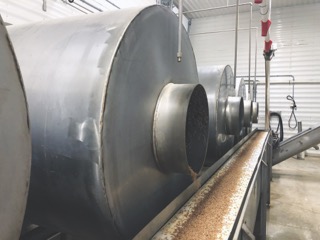
Unlocking new uses and health benefits of wheat
By Lilian Schaer for Canadian Food Innovation Network
Research & Development Grain & Oilseed Milling Canadian Food Innovation Network Editor pick Everspring Farms Food innovation Ontario Cereal Research Council University of Guelph wheat Photo © Takovkalinin/Getty
Photo © Takovkalinin/Getty Although only about 10 per cent of the Canadian population suffers from gluten sensitivity, approximately 30 per cent of Canadians say they avoid consuming wheat products. For the wheat industry, that means it’s critical to strengthen wheat’s image by creating new products with additional health benefits and cleaner labels.
This insight brought together a group of food companies – Ardent Mills, Dare Foods, Everspring Farms, Griffith Foods, Mondelez International, and P&H Milling, all members of the Ontario Cereal Industry Research Council (OCIRC) – to support a research project led by Prof. Iris Joye at the University of Guelph into new products and processes for wheat. The project is part of the Canadian Food Innovation Network (CFIN) Emerging Science Research Cluster.
“Up to 30 per cent of people have decreased their wheat consumption, but that means they are also losing the health benefits associated with wheat consumption, like a high fibre intake,” says Dr. Joye, adding that a failed wheat harvest can have devastating impacts around the world which underscores wheat’s importance as a global food staple.
“Wheat is so important around the world and should still be part of a healthy diet, so we are working to unlock new functionalities and health benefits of wheat,” she adds.
Her research focuses on unlocking new functionalities and healthy properties of soft wheat through sprouting and of coloured wheat through fractionation; and identifying what impact the aging of sprouted and coloured wheat flour or whole meal will have on functionality and health properties.

Sprouted wheat has health benefits, including a higher availability of health-boosting antioxidants. Joye’s team has developed an in-lab sprouting process where soft wheat varieties are sprouted for different lengths of time and then tested in dough and bread-making trials to see how sprouting time affects the quality of end products, such as bread that is larger, darker or has a softer crumb.
“We need to know how enzyme activity and polymer activity change and how that impacts breadmaking, for example,” she says.
According to Joye, the goal is to end up with a product that can be blended with a regular unsprouted flour, resulting in shorter ingredient lists and cleaner labels on food products.
Coloured wheat varieties have anthocyanins in their outer layers whose benefits are often not used to their full potential. Joye and her graduate students are looking at ways those antioxidants can be extracted and then used to provide health benefits in other applications, as well as how sprouting coloured wheat varieties could impact anthocyanin extraction yields.
“What we really want is something we can blend with regular unsprouted flour so that we can have product labels with fewer ingredients while maintaining or improving the quality of the bread,” she says. “So, we are looking at whether sprouting will affect the end product quality, and how we can use antioxidants for best results in commercial applications.”

Photo © Nata_Vkusidey/Getty
Project partner Everspring Farms works with a wide range of grains and seeds used in bakery products and other food manufacturing applications and is keen to take advantage of new opportunities in the sprouted ingredients market.
“Sprouting resonates with people because it is a natural process, but there is a lot we don’t yet know about what happens during the sprouting process and why,” says Everspring President and Co-Founder Dale Donaldson. “This research with Dr. Joye is helping find those answers so we can provide better, more precise products to our customers and provide the scientific evidence they need to meet their specific labelling and product certification requirements.”
Ultimately, he adds, the project’s outcomes will help increase the value of a commodity crop like wheat for everybody along the value chain, including consumers who are seeking healthier, more nutritious food products.
Being able to work with Joye and her graduate students means Everspring can be involved with important research activities that would normally be beyond both its financial and human resource capacities. Without the funding from the cluster, Donaldson notes, the project wouldn’t have taken place, leaving important market opportunities for both farmers and food manufacturers unaddressed.
“The funding is the key to the whole thing. As a business, we are trying to cater to the needs of a very changing, diverse marketplace that is very segmented – people are demanding a lot of benefits to their food but don’t want to sacrifice taste,” he says. “The link is the understanding how to do that and university research is a perfect tool to accomplish that.”
Why is this innovation important?
- Expands understanding of health benefits of wheat sprouting
- Improves taste, texture and shelf life with fewer ingredients
- Creates new product opportunities for consumers reducing wheat intake
What does this project mean to Canada’s food processing industry?
Wheat is an important part of a healthy diet, as well as playing a significant economic role in the food manufacturing industry. New functionalities and health benefits of wheat can open up new product opportunities and markets for Canada’s food manufacturing businesses.
About Ontario Cereal Industry Research Council
The Ontario Cereal Industry Research Council (OCIRC) is a privately funded, open collaborative organization that supports a unique research program at the University of Guelph in cereal science and technology. OCIRC uses its members’ contributions to leverage additional public research dollars to fund discovery, innovation, and development of skilled people.
About the project team
Dr. Iris Joye is an associate professor in cereal chemistry and biochemistry in the Department of Food Science at the University of Guelph. She completed her B.Sc., M.Sc. and PhD in bioscience engineering at the University of Leuven (KU Leuven, Belgium), where she remains active as a part-time lecturer.
Dale Donaldson is the co-owner and president of Everspring Farms, a food ingredient business in southwestern Ontario.
The Canadian Food Innovation Network Emerging Science Research Cluster is funded in part through the AgriScience Program under the Canadian Agricultural Partnership, a federal-provincial-territorial initiative. For more information, contact Laura Sider, science co-ordinator, CFIN.
Print this page